Almost all Victoria Police employees (95%) agree that they ‘know what behaviour constitutes corruption’.
Seven in ten employees (73%) ‘strongly agree’ they know what behaviour constitutes corruption, while one per cent disagree. This result is significantly higher compared to the findings from the 2016 survey of Victoria Police employees where 90% agreed.
Most believe police misconduct occurs in Victoria but not in their workplace; the exception is for employees working in regional locations who are more likely to believe police misconduct is a problem in their workplace.
Perceptions that police misconduct happens and is a problem in Victoria have increased significantly since 2016.
In 2022, a large majority (84%) agree that police misconduct happens in Victoria, far fewer (15%) agree that it is a problem in their workplace. Victoria Police employees working in regional locations are significantly more likely to believe police misconduct is a problem in their workplace (21%).
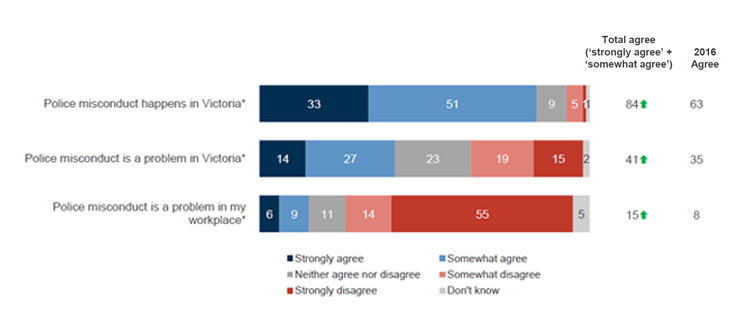
*Note wording change from 2016 – ‘corruption’ replaced with ‘police misconduct’ in 2022. This wording change may have impacted on the comparability of the results between 2016 and 2022 so the results should be compared with caution.
Common corruption or misconduct risks include unauthorised access to information and nepotism.
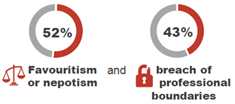 Victoria Police employees were asked to self-nominate the most significant corruption or misconduct risks facing their organisation. Key risks mentioned include nepotism and cronyism, drug use within the force and the disclosure and access of confidential information. Concerns regarding the risks of bribery, assault, failures in duty and associations with organised crime are also touched upon.
Victoria Police employees were asked to self-nominate the most significant corruption or misconduct risks facing their organisation. Key risks mentioned include nepotism and cronyism, drug use within the force and the disclosure and access of confidential information. Concerns regarding the risks of bribery, assault, failures in duty and associations with organised crime are also touched upon.
Most employees say there is a ‘high risk’ of favouritism and breaches of professional boundaries occurring in Victoria Police.
Over half of Victoria Police employees surveyed (52%) say there is a ‘high risk’ of favouritism or nepotism at work and 33 per cent perceive a ‘medium’ risk.
Over 80 per cent of employees also perceive a ‘medium’ or ‘high’ risk of other improper behaviours including breaches of professional boundaries (85%) and inaction (81%).
Women and managers of other managers are significantly more likely to believe there is a ‘medium’ to ‘high risk’ of many of the improper behaviours occurring in Victoria Police.
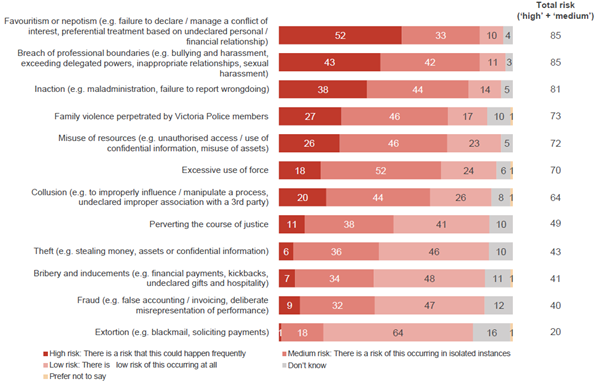
Over half of Victoria Police employees surveyed have suspected or observed behaviours such as bullying and harassment or favouritism.
Approximately 30 per cent claim to have personally observed favouritism or nepotism or a breach of professional boundaries (eg bullying and harassment, exceeding delegated powers, inappropriate relationships, sexual harassment) in the last 12 months (30% and 28% respectively). Slightly fewer have suspected the same improper behaviours over the time period (28% and 25% respectively).
Approximately 90 per cent of Victoria Police employees reported they neither suspected nor observed many of the other forms of improper behaviour within their organisation, such as theft, bribery, or extortion. However, there is a significantly higher incidence of ‘suspecting’ or ‘observing’ bribery and inducements among those who have worked in Victoria Police for up to 10 years (11%).
Among those who live in regional areas, there is a significantly higher incidence of ‘neither suspecting nor observing’ the same behaviour (95%); this is despite the finding that employees working in regional locations are more likely to perceive police misconduct to be a problem in their workplace compared to employees from non-regional locations. These perceptions could be further explored by Victoria Police.
Direct comparisons to the 2016 survey findings are not possible regarding the extent to which employees had observed or suspected the different types of improper behaviours. However, it is noteworthy that in 2022, eight per cent of employees report having personally observed misuse of resources (eg unauthorised access/use of confidential information or misuse of assets) compared to 20 per cent who report having observed misuse of information or material in 2016. However, more employees had suspected these improper behaviours in 2016 (49%) compared to 2022 (25%). A similar trend between 2022 and 2016 has been observed in relation to inaction or ‘abuse of discretion’ (17% personally observed ‘inaction’ in 2022 compared to 22% who had observed ‘abuse of discretion’ in 2016).
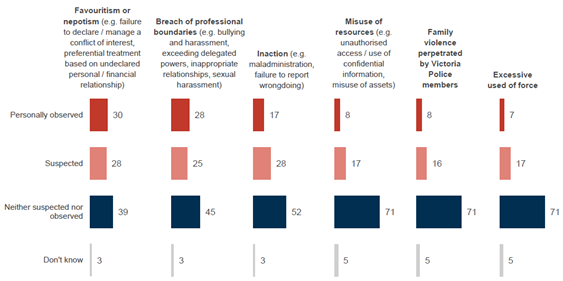
Accepting a bribe or removing drugs from a crime scene are clearly understood to be corrupt behaviours.
Ninety-four per cent of Victoria Police employees think that accepting bribes is ‘definitely’ or ‘probably’ corrupt. Eighty-four per cent think the same for circumstances where drugs are removed from a crime scene.
The behaviours that employees are most likely to consider as ‘probably not corruption or misconduct’ are accepting free food from a fast-food outlet (30%) or when a unit within Victoria Police pays for and hosts an extravagant staff Christmas party (19%).
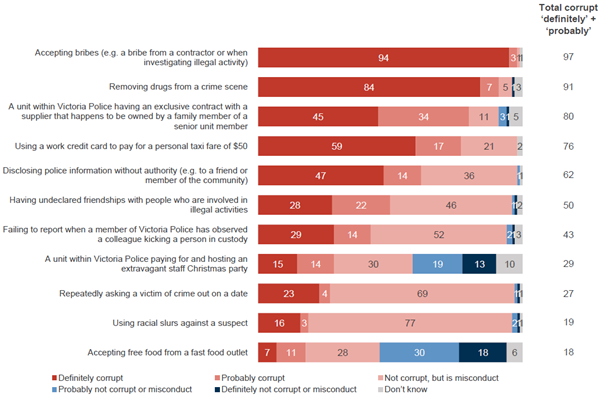
The majority of Victoria Police employees describe the ethical culture as ‘strong’ (34%) or ‘moderate’ (50%).
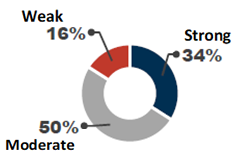
Victoria Police employees working in the organisation for up to 10 years are significantly more likely to rate the ethical culture as ‘weak’ (22%) compared to the average employee (16%).
Victoria Police employees were asked to elaborate on their ratings. There is consensus that the majority of employees behave ethically, and this creates a sense of a strong ethical culture (the actions of a few undermine the overall culture). Among those that rate the ethical culture of the organisation as weak there is a recurring theme that senior staff set the standards but do not necessarily adhere to them.
Examples of some of the comments that illustrate these themes are provided below.

More than nine in ten employees surveyed believe their organisation is vulnerable to misconduct or corruption.
Only nine per cent of Victoria Police employees rate their organisation as ‘not vulnerable’ to corruption and misconduct.
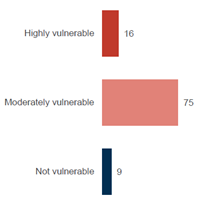


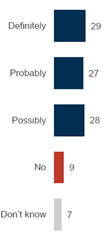
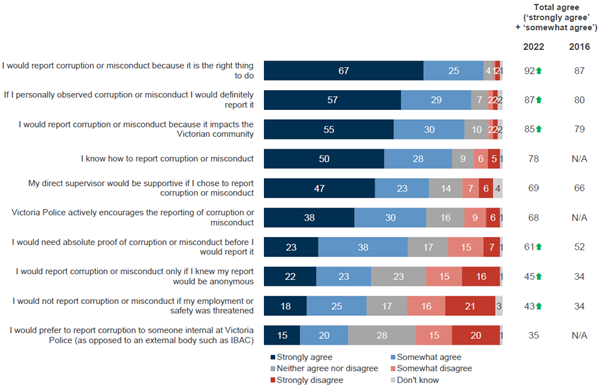
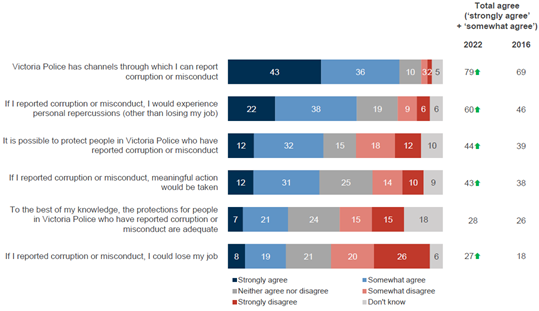
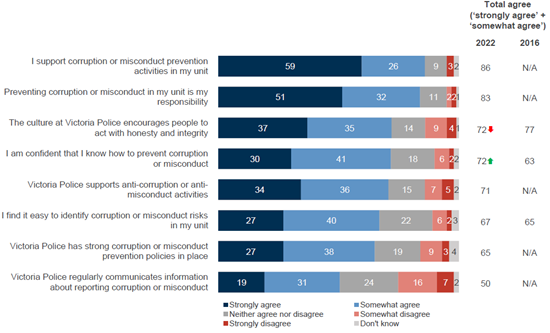
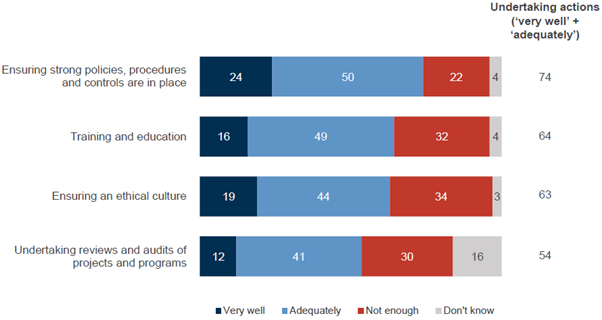
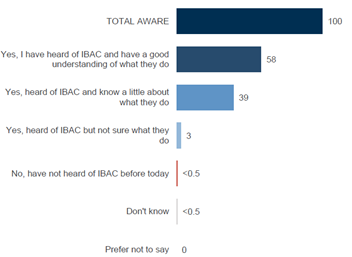
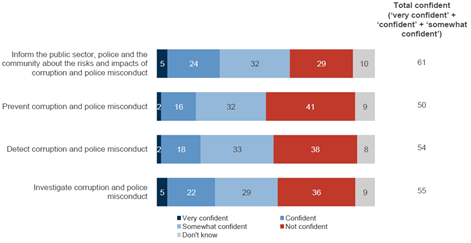

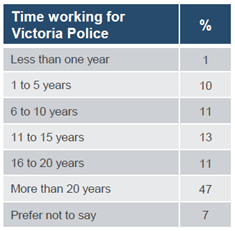 Here is a snapshot of the demographic characteristics of participants who completed the Victoria Police survey:
Here is a snapshot of the demographic characteristics of participants who completed the Victoria Police survey: